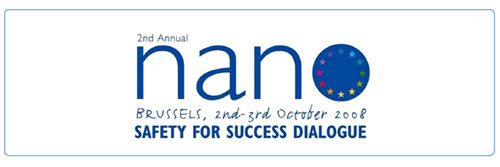| Posted: Jan 09, 2009 | |
Nanotechnology safety for success dialogue |
|
| (Nanowerk Spotlight) Stakeholders attending the second annual "Safety for Success" dialogue last October in Brussels agreed that while many activities had taken place during the past year towards the responsible development and regulation of nanotechnologies more effort was needed. Discussion highlighted three areas that require coordinated effort from all parties: 1) Developing trustworthy information on products containing nanomaterials that are on or near the market, and on how they are tested. 2) Meaningful public engagement on the basis of shared definitions of nanotechnology. 3) Ongoing regulatory reviews to provide clear guidance to industry on how to interpret regulatory frameworks, and clear indications to the public about action being taken in cases where relevant risk data is limited or uncertain. In addition, the meeting identified a number of key points that need to be addressed in order to meet these three priorities. | |
 |
|
| Further research on nanotechnology risks remains a significant priority. This work should include developing practical methodologies for testing nanomaterials. For example, more work is required to make reliable comparisons of in vitro and in vivo toxicology studies. Further work is needed on exposure routes and effects of longterm exposures to low dosages. | |
| In addition, more knowledge is needed about nanomaterials in the environment, including questions of aggregation and disaggregation, accumulation, and interactions with other chemicals. | |
| In the area of regulation, further clarification is requested regarding the adequacy of current regulation given uncertainties about the characterization and biological properties of nanomaterials. The meeting discussed developing regulatory options for pre-market intervention (assessment and authorization processes) including the question of considering nanomaterials as ‘new’ substances. | |
| Finally, work is required on the introduction of post-market monitoring systems and consideration of the question of labeling. | |
| The meeting requested that industry make information on safety aspects of nanotechnology containing products more accessible to regulators and consumers. While industry has engaged in several public dialogue processes in recent years further effort is needed to ensure that these are visible, well co-ordinated and lead to meaningful action. | |
| Many participants agreed that positive steps had been taken during the past year. However, the overarching question remained how to ensure public confidence in efforts by all stakeholders to provide relevant information, develop appropriate testing methods, deal with remaining questions of uncertainty over risks, and appropriately implement regulatory frameworks. | |
| The workshop was organized into sessions, each of which featured several presentations: | |
| Session 1: Science and risk assessment | |
Latest developments in nanotoxicology
Prof. Günter Oberdörster, University of Rochester |
|
Issues linked to carbon nanotubes Ken Donaldson, University of Edinburgh |
|
From non-food to food risk assessments Dr. Wim de Jong, Dutch National Institute for Public Health and the Environment (RIVM) |
|
Nanomaterials and the environment Prof. Teresa Fernandes, Napier University |
|
The European commitment to nano safety research Ms. Pilar Aguar-Fernandez, European Commission, DG Research |
Session 2: Regulation |
Regulatory challenges of nanotechnologies Prof. Graeme Hodge, Monash University, Melbourne |
|
Regulatory aspects of nanotechnologies in the EU Mr. Cornelis Brekelmans, >European Commission, DG Enterprise |
|
A societal perspective on regulation Ms. Laura Degallaix, BEUC - the European Consumers' Organisation |
|
| Session 3: International developments | |
International safety assessment of nanomaterials Dr. Jim Willis, US Environmental Protection Agency |
|
International monitoring of nanotechnologies Dr. Robert G. Rudnitsky, US State Department |
|
International standards Dr. Peter Hatto, IonBond Ltd. |
|
| Session 4: Risk governance, communication, and perception | |
Risk governance Prof. Ortwin Renn, University of Stuttgart |
|
Risk communication Dr. Jørgen Schlundt, WHO, INFOSAN |
|
Risk perception Prof. James Hammitt, Harvard University School of Public Health |
|
| Session 5: Communication with the customer | |
|
Mrs Jenny Holmqvist, European Chemical Industry Council (CEFIC) |
|
Communicating business-to-business product information Dr. Markus Pridoehl, Evonik |
|
Communicating business-to-consumers product information Ms. Karolyn Kranz, BASF |
|
Consumer expectations on product information Mr Michael Hansen, Consumers Union |
|
| Session 6: Highlights from the participant survey on communication, legislation, and its implementation | |
| Session 7: "Introduction to the discussion on the implementation of the existing legislation: Examples from the chemical, medical, and food areas" | |
Guidance in the chemicals area Dr. Peter van der Zandt, European Commission, DG Environment |
|
Guidance in the medical area Dr Marisa Papaluca-Amati, EMEA |
|
Guidance in the food area Dr. David Carlander, EFSA |
|
| Session 8: "Identification in break-out groups of means to improve (i) communication and (ii) the implementation of the existing legislation in the chemical, medical, products, and food areas (priorities and next steps, for whom and when)" | |
Recommendations of breakout group 1: Chemicals Recommendations of breakout group 2: Medicines | |
| A copy of the entire workshop report, including a summary of the discussions is also available as a pdf download (264 KB). | |
 By
Michael
Berger
– Michael is author of three books by the Royal Society of Chemistry:
Nano-Society: Pushing the Boundaries of Technology,
Nanotechnology: The Future is Tiny, and
Nanoengineering: The Skills and Tools Making Technology Invisible
Copyright ©
Nanowerk LLC
By
Michael
Berger
– Michael is author of three books by the Royal Society of Chemistry:
Nano-Society: Pushing the Boundaries of Technology,
Nanotechnology: The Future is Tiny, and
Nanoengineering: The Skills and Tools Making Technology Invisible
Copyright ©
Nanowerk LLC
|
|
|
Become a Spotlight guest author! Join our large and growing group of guest contributors. Have you just published a scientific paper or have other exciting developments to share with the nanotechnology community? Here is how to publish on nanowerk.com. |
|
